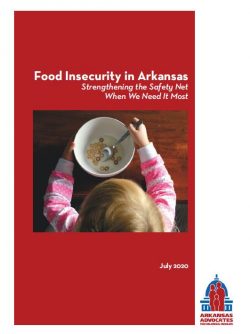
More than 150,000 Arkansans are estimated to be newly food insecure since the COVID-19 pandemic began, and state policies are making it harder for families to get the nutritional support they need during this time of crisis.
Our new report calls for the state to eliminate policies that make it more difficult to be hungry here than in most other states. For example, Arkansas is one of only 10 states with an “asset limit” that prevents families with even modest savings accounts from becoming eligible for SNAP – the Supplemental Nutrition Assistance Program. Regardless of household size, Arkansas’s families are automatically ineligible if they have more than $2,250 in the bank ($3,500 if the household includes someone with a disability or someone 60 or older). Most states have no such asset limit, and many others have raised the limit so families can save more for emergencies.
While Arkansas lifted many of the barriers to SNAP enrollment when the pandemic started, the asset limit remains in place because it would take legislation to change it.
As a relatively poor state, we shouldn’t be adding to the burden of food insecurity for Arkansans in the middle of a pandemic. These state policies are unnecessary and put us at a disadvantage, now and during the economic recovery to come.
Among other recommendations, the report calls for Arkansas to reverse a 2017 law that barred the state from participating in “Broad-Based Categorial Eligibility” options. The state law requires that the SNAP asset limit be kept at the lowest level allowed under federal law. AACF also recommends removing compliance with the Child Support Enforcement program as a condition of SNAP eligibility, which takes away food benefits from children and parents – even if they’re owed child support. The latter requirement has been temporarily lifted during the health emergency.
The publication also outlines changes to SNAP since the pandemic began, including a state-reported 27 percent increase in enrollment since February. The Arkansas Department of Human Services reports that about 318,000 people were enrolled in SNAP before the pandemic began, compared to about 404,000 at the end of June. Meanwhile, Feeding America estimates that the food insecurity rate increased by about 39 percent during the same time period, or that about 150,000 more Arkansans now lack consistent access to enough food for everyone in the family to live active, healthy lives.
Download the full report below to learn more about SNAP in Arkansas and read AACF’s policy recommendations.
